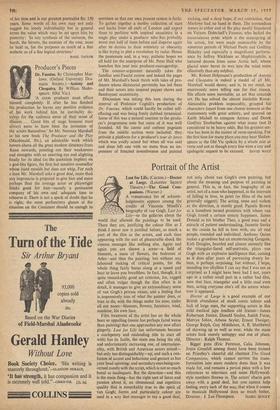Producer's Pieces
'A GOOD producer must efface himself completely. If after he has finished his production he leaves any positive evidence of, .nis work behind him he inevitably de- stroys for the audience some of their sense of illusion.... Good bits of stage business must always seem to have been the invention of the actors themselves.' So Mr. Norman Marshall in his new book The Producer and the Play (Macdonald, 30s.), an admirable work which hovers above all the great modern directors from Kean onwards, pointing out their weaknesses and strengths with an unerring eye and alighting finally for its ideal (as the quotation implies) on a god-like figure, the firm but sensitive counsellor whose hand moulds but does not whip. For such a Man Mr. Marshall asks a great deal, more than any impresario is prepared to give him and more perhaps than the average actor or playwright thinks good for him—namely a permanent company of his own and adequate time to rehearse it. There is not a speck of doubt that he is right; the most perfunctory glance at the situation on the Continent should be enough to
convince us that our own present system is futile. To gather together a motley collection of stars and hacks from all ends of London and expect them to perform with inspired unanimity in a single play under a producer who has probably never met half of them before and disperse again after its demise to their notoriety or obscurity is like trying to plot a revolution by radar. Hence the passionate and, in a way, pathetic hopes we all hold for the enterprise of Mr. Peter Hall who launches this year into producer-managership.
The counter-argument naturally takes the familiar anti-Fascist course and indeed the pages of Mr. Marshall's book throb with tales of pro- ducers whose dictatorial perversity has led them and their actors into inspired puppet shows and flamboyant eccentricity.
Discussion was taking this turn during the interval of Professor Coghill's production of Dr. Faustus, which could hardly be called self- effacing and was being freely dubbed tyrannical. Some of this was a natural reaction to the produ- cer's programme note but some of it was well founded. All the comic and curious pageants from the middle section were included; they provide a platform for a producer's tour de force which was avidly seized but when all was said and done left one with no more than an im- pression of frenzied inventiveness and painted
sacking, and a deep hope, if not conviction, that ' Marlowe had no hand in them. The tremendous scenes at either end of the play nearly foundered on Vernon Dobtcheff's Faustus, who lacked the mountainous pride which is the mainspring of his action, but were made memorable by the sonorous periods of Michael Poole and Godfrey Blakeley and especially a magnificent perform- ance by Jeffrey Wickham as Mephistophilis, a tortured demon from some Arctic hell, whose glacial sneer burnt its way into the mind more effectively than any sulphur.
Mr. Robert Helpmann's production of Antony and Cleopatra is indeed a model of all Mr. Marshall would desire, and is, to my mind, an enormously more telling one for that reason. His effects seem inevitable, an art that conceals art. He has solved the almost insoluble Rome- Alexandria problem impeccably, grouped his characters (apart from one clumsy moment at the monument) with great artistry, and spurred on Keith Michell to compass Antony and Derek Godfrey Enobarbus against what many (not I) considered to be heavy odds. But his greatest ser- vice has been in the matter of verse-speaking. For the first time for many plays you may hear Shakes- speare at the Old Vic spoken by a whole cast as verse and not as though every line were a coy and apologetic request to be excused. DAVID wArr


































 Previous page
Previous page